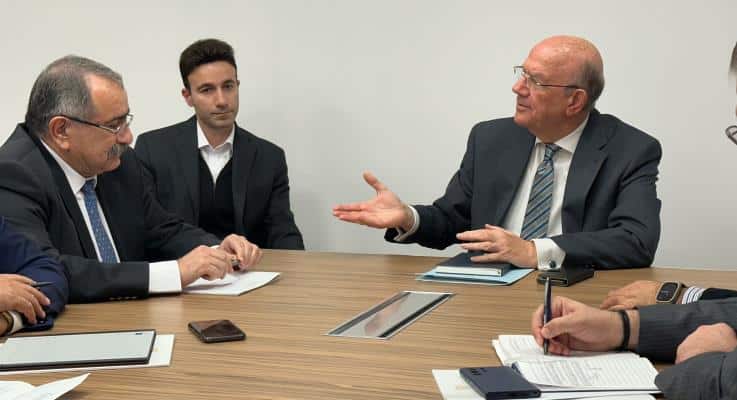Finance Minister Makis Keravnos on Monday met with the newly elected president of the Cyprus Chamber of Commerce and Industry (Keve) Stavros Stavrou, to discuss the challenges facing the Cypriot economy, particularly within the context of external geopolitical uncertainty.
Accompanied by members of the chamber’s executive committee, Stavrou’s meeting with the Finance Minister covered a wide range of current issues on the agenda, including interest rates, the demand for foreign labour on the island, regional instability, as well as the ongoing issue of tax reform.
In a joint statement following the meeting, Keravnos expressed satisfaction with the alignment of approaches in addressing various problems.
“Our relationship has been and continues to be productive, in the context of collaboration on how we can improve issues and challenges facing our economy today, in order to maintain the resilience of our economy on the right track, especially in a period of numerous geopolitical crises,” the Finance Minister stated.
On his part, Stavrou stressed the importance of exchanging views, in order to resolve critical issues and be able to move forward.
Highlighting the topics discussed, Stavrou said that high interest rates, as well as the impact of regional conflicts on our economy, and the ongoing tax reform, were key points of the discussion.
“We want to work together to achieve the best possible solution, discussing new incentives for business owners, and to address the crucial issue of labour shortages,” Stavrou said.
“We sought the minister’s assistance on this matter and received a positive response within his jurisdiction,” he added.
Stavrou also said that the dialogue between the chamber and the ministry will continue, noting that the exchange of views is constructive because “we are aiming for the same purpose, a robust economy, a healthy economy, and healthy business climate”.
When questioned about pressing issues raised by Keve, such as foreign labour, the cost of living allowance (CoLA), the expansion of the state payroll, and collective agreements, Keravnos said that agreements are being reached within the framework of the implementation of various policies.
“When we realise that corrections need to be made, corrections must be made,” Keravnos said.
Regarding the issue of CoLA, Keravnos reiterated that any adjustments must now be linked to the rate of productivity and competitiveness of the economy, while also considering other aspects that need to be examined.
On the issue of interest rates, the Finance Minister said that “everyone agrees and acknowledges that they are currently at a high level”, which does not help the Cypriot economy, making it difficult for businesses and households to meet their loan needs.
“Therefore, each of us, from their position, continues the dialogue with the relevant stakeholders so that we can find a way out, and for our economy to function effectively,” he added.
What is more, Stavrou echoed his agreement with the Finance Minister on the issue of CoLA.
Reminding that the chamber’s position was the complete abolition of CoLA, he noted that “having different opinions and discussing without reaching any conclusions is not an end in itself”.
However, he pointed out that a new agreement on the basis described by the Finance Minister is set to take place by June 2025.
“We look forward to this dialogue culminating in a documented formula that will result in a final number for CoLA,” Stavrou said.
“We cannot always stick to positions and end up in labour disputes,” he added.
“For us, labour peace is a very serious and legitimate achievement, and to move forward, solutions must be found,” the Keve president concluded.







Click here to change your cookie preferences